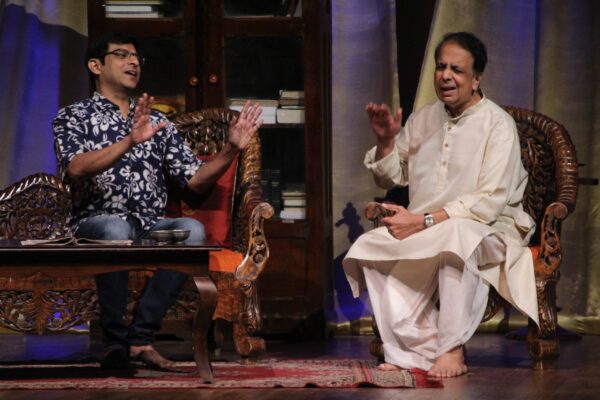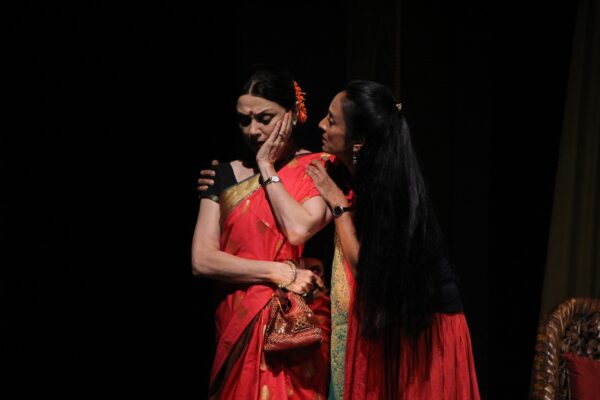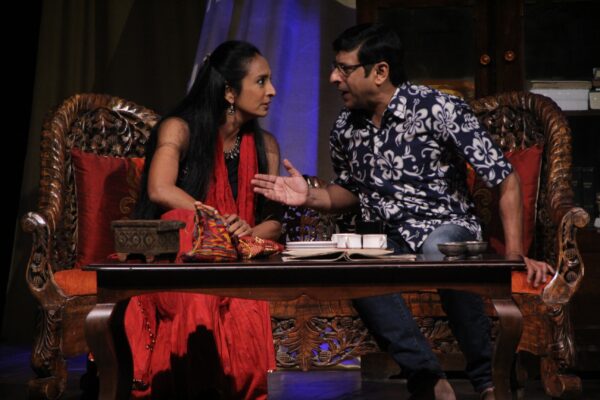Jaipur’s theater enthusiasts were treated to a captivating performance of Mahesh Dattani’s acclaimed play “Dance Like a Man” at the Rajasthan International Center (RIC) by the renowned Primetime Theatre Company from Mumbai. Directed by the acclaimed actress Lillete Dubey, on the surface, Mahesh Dattani’s Dance Like a Man examines family relationships. However, as the plot delves into a complex emotional landscape, it reveals themes that challenge mainstream societal norms.

The story centers on Jairaj and Ratna, two Bharatanatyam dancers past their prime, and their daughter Lata, who is on the cusp of achieving great success in dance. As Lata’s impending success stirs tension and jealousy, the audience is drawn into the family’s dark secrets and generational conflicts. The play delves beneath the characters’ surfaces to explore their deeper motivations, blending comedy with serious undertones, leaving you torn between laughter and tears.
The play offers a powerful examination of gender roles and societal expectations in Indian culture. The title ‘Dance Like a Man’ implies that a man should adhere to societal expectations of masculinity and avoid any pursuits that might be seen as diminishing his manhood. In the play, this notion is reflected in the protagonist’s father’s disapproval of his son’s passion for dance, which he views as an unmanly and inappropriate career choice. Dattani’s narrative challenges these stereotypes, promoting a broader understanding of identity and artistic expression.

The play also tackles generational conflicts, depicting the tension between the older generation’s traditional values and the younger characters’ aspirations. Jairaj’s conflict with his father, Amritlal, represents the larger societal shift toward individualism and personal choice in modern India. Their dialogues reveal deep-rooted prejudices that affect both familial relationships and personal ambitions. For Amritlal, dance is a profession associated with prostitutes, making it impossible for him to accept his daughter-in-law pursuing it and unthinkable for his son to make a career out of it. As a reformist, Amritlal is also deeply concerned that Jairaj’s choices will tarnish his reputation and invite ridicule, sacrificing the standing he has worked hard to build. Amritlal, in an attempt to deter Jairaj from dancing, tells him, “A woman in a man’s world is seen as progressive, but a man in a woman’s world is seen as pathetic.” He later strikes a deal with his wife, Ratna, agreeing to support her career on the condition that she helps steer Jairaj away from his passion for dance and shapes him into a more ‘manly’ man.

Lillete Dubey’s artistic direction brings a distinctive vision to the play, emphasizing the emotional depth of the characters while maintaining a minimalist stage design that allows the story to take center stage. This approach not only enhances the choreography but also deepens the exploration of the characters’ internal struggles. Dubey’s passion and experience in theater are evident, creating a performance that is both emotionally rich and visually resonant.The play’s two-act structure effectively contrasts past and present, allowing the audience to observe the evolution of the characters and their relationships. The use of lighting and space adds layers of meaning, mirroring the complexities of the characters’ lives and the societal pressures they face.

The longest running Indian play in English, ‘Dance Like a Man’, is considered a milestone in Indian theater, having been widely performed across India and internationally, including a two-week Off Broadway run in New York and performances at prestigious festivals in the United States, United Kingdom, and Asia. In Jaipur, this was the 678th performance of the play. The cast of the play included Lilette Dubey, Joy Sengupta, Ananth Mahadevan and Suchitra Pillai.
Tusharika Singh
Latest posts by Tusharika Singh (see all)
- Music experiences in the Pink City - January 11, 2025
- Jaipur Literature Festival 2025 Announces First List of Speakers for Landmark 18th Edition - December 3, 2024
- From Rejection to Recognition: Jaipur’s Abhishek Mudgal joins NSD as stage manager - December 2, 2024








